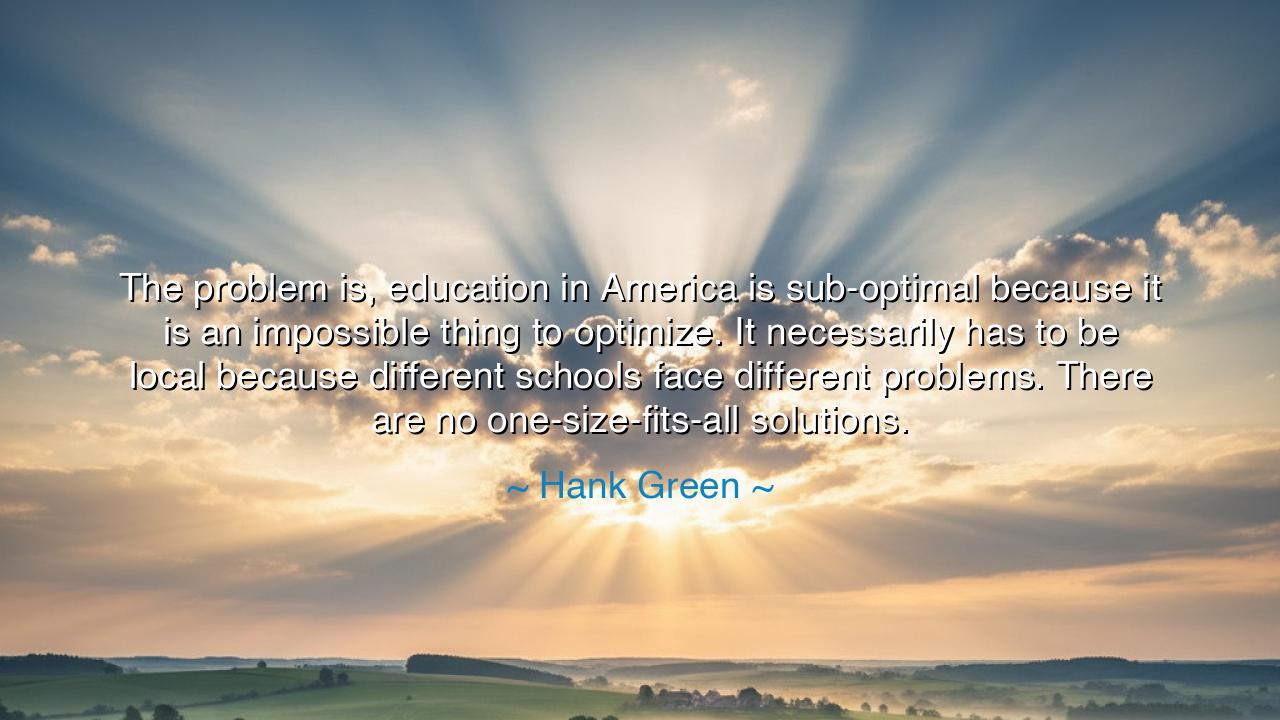
The problem is, education in America is sub-optimal because it is
The problem is, education in America is sub-optimal because it is an impossible thing to optimize. It necessarily has to be local because different schools face different problems. There are no one-size-fits-all solutions.






The teacher of modern minds, Hank Green, once declared: “The problem is, education in America is sub-optimal because it is an impossible thing to optimize. It necessarily has to be local because different schools face different problems. There are no one-size-fits-all solutions.” In this, he speaks with the clarity of one who understands both the limits of systems and the infinite variety of human need. For education is not a machine that can be tuned once and forever, but a living garden, planted in countless soils, watered by countless hands, and subject to countless climates.
What Green names here is the folly of uniformity. To imagine that a single law, a single policy, or a single method could solve all the challenges of education is to deny the diversity of the land and the people who inhabit it. A rural school may struggle with distance, isolation, and scarcity; an urban school may battle with overcrowding, poverty, and violence. Each faces trials unique to its soil. To force upon both a single solution is not wisdom, but blindness. Thus Green reminds us: education must be local, responsive to the needs of each community.
History itself proves this truth. In ancient China, Confucius taught that harmony in society comes from harmony in the family and the village. Learning began at home, within the customs of each place, and only then extended outward to the empire. When rulers ignored local traditions and forced rigid uniformity, rebellion and collapse followed. Similarly, in the Roman Empire, schools were adapted to the provinces—Greek philosophy in Athens, rhetoric in Rome, law in Gaul. It was this flexibility that allowed learning to endure across so vast a realm.
We see the same lesson in America’s own story. The one-room schoolhouses of the frontier bore little resemblance to the academies of the cities, yet each prepared children for the life before them. The pioneer child learned resilience and practicality; the city child learned commerce and trade. Both forms of learning were valid, because each was shaped by the problems of its place. To force them into sameness would have been to rob both of their strength.
Green’s words also carry a subtle warning. The desire to “optimize” education springs from a noble heart—it seeks to make the system efficient, fair, and excellent. But the danger lies in mistaking efficiency for justice, or uniformity for quality. In truth, education is as varied as the children who receive it. What works for one mind may fail another. What saves one school may sink another. Leaders who ignore this truth risk harming the very ones they seek to help.
The meaning for us is clear: if we would strengthen education, we must begin not with grand designs alone, but with attentive listening. We must honor teachers who know their students, parents who know their children, and communities who know their struggles. National vision is important, but it must leave space for local wisdom. Just as the body is nourished by blood flowing to each organ according to its need, so must education flow to each community according to its challenge.
The lesson, then, is both humble and heroic: seek solutions that fit the place you serve. Do not demand that others conform to your way, but adapt your way to the needs of others. Support local schools with resources, but trust them with freedom. Encourage innovation, but honor tradition where it proves strong. In this balance lies the path to better learning—not perfect, for perfection is impossible, but ever-improving, ever responsive, ever alive.
Thus Hank Green’s words shine as both caution and guidance: “There are no one-size-fits-all solutions.” Take them to heart, O seeker of wisdom. For in a world that craves simple answers, it is the mark of maturity to accept complexity. And in the realm of education, where the future of nations is forged, let us remember: diversity is not a flaw to be corrected, but a strength to be embraced.






AAdministratorAdministrator
Welcome, honored guests. Please leave a comment, we will respond soon